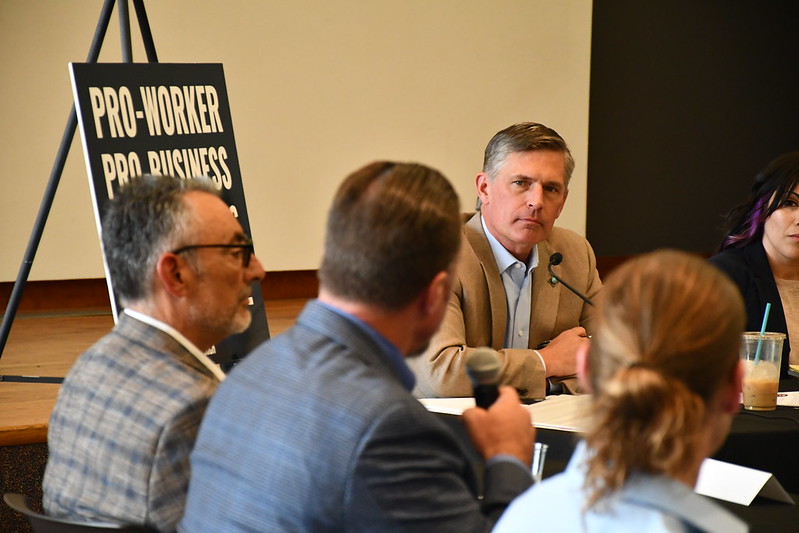Pro-Worker, Pro-Business Opportunities
Dear Friend,
Last week, I hosted a Pro-Worker, Pro-Business Opportunities Roundtable in Albuquerque with folks in the health care, education, and skilled trades workforce. We discussed how legislation we’ve passed into law—like the Inflation Reduction Act, the Infrastructure Law, and the CHIPS and Science Act—is growing our middle class and creating careers for New Mexicans in their home communities.

PHOTO: U.S. Senator Martin Heinrich, Chairman of the U.S. Joint Economic Committee, hosts a Pro-Worker, Pro-Business Opportunities Roundtable in Albuquerque, October 17, 2024.
I hope you can read about our discussion in the New Mexico Political Report story below.
The advanced manufacturing and clean energy renaissance we have spurred with historic investments is creating career opportunities across New Mexico. I’m working to pass my bipartisan legislation to build on this momentum by expanding access to apprenticeships and pre-apprenticeships that help get New Mexicans into new, high-quality jobs in the building and skilled trades, growing pathways to health care careers, and strengthening our early childhood education workforce.
I will continue fighting to address workforce shortages, build the middle class, grow our economy, and provide more New Mexicans with the careers they can build their families around in their home communities.
Sincerely,
MARTIN HEINRICH
United States Senator

By Hannah Grover
After taking out loans and working $9 an hour jobs to pay her way through college, Sofia Thompson felt a bit lost. She had an associates degree in biology from Ivy Tech Community College in Indiana, but was looking for a job to earn some money before continuing her education.
That was when she and her mother decided to attend a job fair. What happened next changed her life.
“I went to a job fair and I walked out with a career,” Thompson said during a roundtable discussion in Albuquerque on Thursday.
While at the job fair, she enrolled in an apprenticeship program with the SMART Local Union 49 that allowed her to get paid and work while also receiving the necessary training. She is now living in New Mexico and is on her path to becoming an air test and balance technician.
She said she realized after joining the apprenticeship program that it was the work she wanted to do and that it could provide for her and help her support a family in the future.
The roundtable discussion hosted by the federal Joint Economic Committee focused on ways to build the workforce in areas like childcare, health care, building trades and clean energy. U.S. Sen. Martin Heinrich, D-New Mexico, led the discussion.
“We are seeing an increase in workforce demands for careers in education, healthcare, manufacturing and a whole range of clean energy occupations right now,” Heinrich said. “Just last year, jobs in clean energy grew at more than twice the rate of the overall labor market.”
He said this increase in jobs is due to federal legislation like the Inflation Reduction Act, the CHIPS and Science Act and the Infrastructure Investment and Jobs Act, or bipartisan infrastructure law. These laws also included various efforts to support apprenticeship programs like the one that Thompson is participating in.
Heinrich has also sponsored two bills intended to help grow apprenticeship opportunities. Both pieces of legislation are pending a hearing in the Senate Committee on Health, Education, Labor, and Pensions.
Courtenay Eichhorst is the business manager of UA Local 412, which represents plumbers and pipefitters in New Mexico. He said it can be hard for some of the people in rural areas of New Mexico to receive the training needed to enter into a career in construction or skilled trades. That is why his union has a mobile training unit that travels throughout the state to help train the future generation of workers.
“We’re helping the students train where they are, where they grew up, where they’re from, where their family is,” he said.
Being able to make money while learning is important to people like Cesia Gonzales, Latina who has a paid internship that is allowing her to study nursing at the University of New Mexico.
“For a lot of people like me, we don’t have the college fund,” she said.
She said the internship opened up doors for her.
She said it is comforting to have an internship that allows her to support herself while obtaining an education and to know that she’ll have a job upon graduation.
The roundtable participants also spoke about building opportunities in high school.
Kevin Brandvold took welding classes while attending high school in Belen. He now works as a long seam operator at Arcosa Wind Towers.
The Inflation Reduction Act paved the way for Arcosa to open a facility in Belen. Brandvold said this facility provided new opportunities for employment for people south of Albuquerque.
“You can come in with no experience and we’ll put you through the welding school,” he said.
John Pello, vice president and general manager at Arcosa, said there is an opportunity to improve the workforce pipeline and funnel students from high school into good-paying careers.
“I think you start with that by also creating awareness that you can come out of a high school program and jump right into a job,” he said.
Pello pointed to Brandvold as an example.
“Kevin has been here with us not even quite a year,” Pello said. “He has plenty, plenty of room to continue to grow with us.”